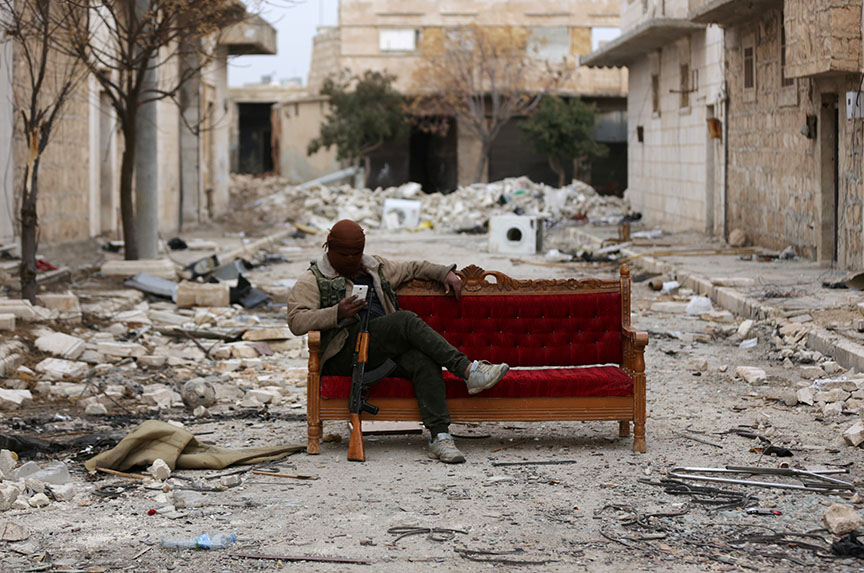 US Secretary of State Rex Tillerson’s trip to the Middle East this week comes amid escalating tensions between NATO allies Turkey and the United States as their forces stare down one another in war-ravaged northern Syria.
US Secretary of State Rex Tillerson’s trip to the Middle East this week comes amid escalating tensions between NATO allies Turkey and the United States as their forces stare down one another in war-ravaged northern Syria.
While Tillerson’s agenda is notably missing a stop in Israel, the secretary will meet with leaders in Turkey, as well as Egypt, Jordan, Kuwait, and Lebanon.
The Turkey stop on his tour will surely be wrought with tension considering the standoff currently playing out between their respective armies.
On one side you have US Special Forces alongside a coalition of fighters known as the Syrian Democratic Forces (SDF), comprised primarily of Syrian Kurds with some Arabs and other groups in the mix.
The Kurdish fighters have proven most effective at ridding northern Syria of the Islamic State of Iraq and al-Sham (ISIS). However, their success makes Turkey nervous in that Ankara has been at odds with the Kurdish minority in their own country for decades, a fight that has left tens of thousands dead on both sides.
The tension between the Turks and the Kurds is due to the latter demanding greater rights and, by some Kurdish leaders an independent homeland compromised of territory from eastern Turkey, as well as parts of several other regional countries, including Syria.
Following World War I, when Western powers were redrawing the map of the Middle East in the ashes of the Ottoman Empire, the Kurds had hoped that they would be given a nation to call their own. Instead, they became the world’s largest, stateless ethnic group and since then have been systematically discriminated against and persecuted in Turkey and other countries.
As such, the power vacuum filled by Kurdish fighters when they defeated ISIS in northern Syria has Turkey concerned about the intentions of the armed group approaching their back porch.
In January, Turkish fighter jets acted on that concern when they attacked Kurdish fighters in the northern Syrian town of Afrin, a move that raised eyebrows in the United States and prompted diplomatic calls for de-escalation before the matter got out of hand.
That could be a real possibility as Turkish forces now find themselves in close proximity to US and Kurdish forces in northern Syria. In and around Afrin, a city some eighty miles from US forces in Manbij, there are thought to be a total of about 20,00 Turkish soldiers fighting alongside the one-time ally of the United States: the Free Syrian Army or FSA. Turkey has said its force will move onto Manbij once it is finished in Afrin, while US forces say they aren’t leaving the area anytime soon, setting the stage for a potential showdown between allies.
There is certainly no love lost between the Kurdish-dominated SDF and the FSA, whose ranks now include members that were previously associated with Al Nusra Front, also known as al Qaeda in Syria.
Clashes between the two groups go as far back amid Syria’s civil war as 2012 and are based on territorial and ideological differences over governance of a Syria once rid of ISIS.
None of this is ideal for US Special Forces in Manbij, who are thought to only number in the hundreds, in addition to their SDF allies. Were the situation to get out of hand and shots fired, US forces would not only be outgunned, it would mark the first time in the history of the NATO alliance that two member nations have come to the verge of trading blows since 1974 when Turkey and Greece came to the brink over Turkey’s invasion and occupation of northern Cyprus.
As it stands, this situation calls for deft diplomacy by Tillerson when he visits Turkey in hopes of avoiding such a catastrophe that would not only threaten the lives of innocent civilians caught in the middle, but the future of NATO if Turkey were to decide to downgrade its relationship with the Alliance.
Amid these growing tensions, and with a secretary of state whose authority is regularly undercut by the White House, finding a much-needed diplomatic solution to the current tensions between Turkey and the United States is going to be challenge to say the least.
Carmen Gentile is a freelance journalist and author of the book “Blindsided by the Taliban.” Follow him on Twitter @CarmenGentile.
Image: A Turkey-backed Free Syrian Army fighter is seen in the eastern suburbs of al Bab, Syria, on February 4. (Reuters/Khalil Ashawi)

